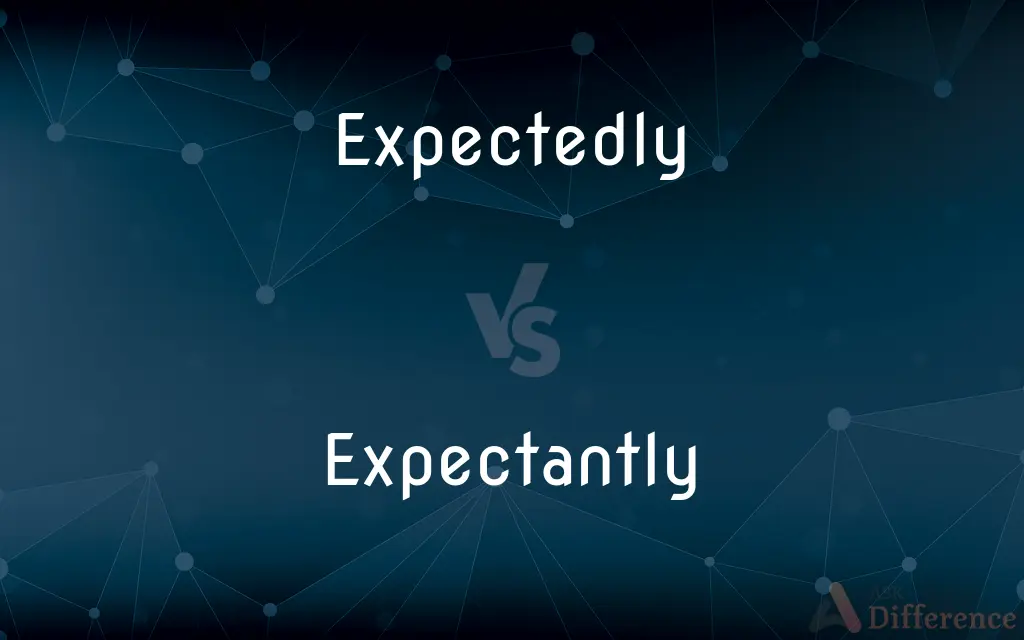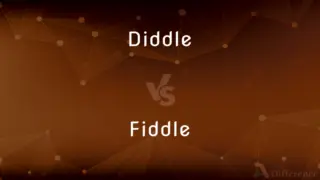Expectedly vs. Expectantly — What's the Difference?
By Fiza Rafique & Urooj Arif — Updated on April 29, 2024
"Expectedly" means in a way that anticipates something known or predictable, while "expectantly" describes a state of eagerness or anticipation for something uncertain.

Difference Between Expectedly and Expectantly
Table of Contents
ADVERTISEMENT
Key Differences
"Expectedly" is used when an outcome is anticipated based on previous knowledge or predictability, implying that events unfold as foreseen. On the other hand, "expectantly" conveys a sense of eagerness and anticipation, often without knowing the outcome, reflecting hope or excitement about what is to come.
In literature, "expectedly" might be used to describe a plot development that follows logically from the story's events, suggesting a natural progression. Conversely, "expectantly" is often used to describe characters who are waiting for something exciting or significant, enhancing the emotional or suspenseful aspect of the narrative.
When discussing behavior, "expectedly" might refer to actions that conform to established patterns or norms, while "expectantly" describes behavior characterized by alertness and readiness, often in the context of awaiting news or results.
In everyday speech, "expectedly" is less commonly used and tends to sound more formal or technical, suited for written reports or analysis. In contrast, "expectantly" is more colloquial and widely used in verbal communication, especially in expressive or emotional contexts.
The emotional undertone of "expectedly" is generally neutral, as it relates to predictable outcomes. In contrast, "expectantly" carries a positive or hopeful connotation, often used when there is an emotional investment in the anticipated event.
ADVERTISEMENT
Comparison Chart
Meaning
As anticipated, predictably
With eagerness, in anticipation
Usage in Narrative
Indicates logical outcomes
Adds emotional or suspenseful tone
Emotional Connotation
Neutral
Positive, hopeful
Common Contexts
Formal, analytical
Emotional, conversational
Behavioral Implication
Conformity to norms
Readiness, alertness
Compare with Definitions
Expectedly
Consistently with prior outcomes.
Expectedly, the sequel was a box office hit.
Expectantly
Expressing excitement about potential outcomes.
He glanced expectantly at his phone for any news.
Expectedly
In a predictable manner.
The meeting concluded expectedly with no objections.
Expectantly
With anticipation or eagerness.
She looked expectantly at the door, hoping for his arrival.
Expectedly
Following usual patterns or expectations.
He reacted expectedly to the news.
Expectantly
Awaiting something uncertain.
The crowd waited expectantly for the announcement.
Expectedly
Without deviation from the norm.
The project progressed expectedly.
Expectantly
Indicating readiness for future events.
They gathered expectantly for the imminent speech.
Expectedly
As anticipated, without surprise.
Expectedly, the seasoned player won the match.
Expectantly
With a hopeful outlook.
They watched expectantly as the lottery numbers were called.
Expectedly
To look forward to the probable occurrence or appearance of
Expecting a phone call.
Expects rain on Sunday.
Expectantly
With an excited feeling that something is about to happen, especially something good
She waited expectantly for his answer
He looked expectantly at his friend
Expectedly
To consider likely or certain
Expect to see them soon. See Usage Note at anticipate.
Expectantly
Having or marked by expectation
An expectant look.
An expectant hush.
Expectedly
To consider reasonable or due
We expect an apology.
Expectantly
Pregnant
Expectant mothers.
Expectedly
To consider obligatory; require
The school expects its pupils to be on time.
Expectantly
In an expectant manner.
The cat looked expectantly at the mouse.
Expectedly
(Informal) To presume; suppose.
Expectantly
In an expectant manner;
She looked at him expectantly
Expectedly
To be pregnant. Used in progressive tenses
My wife is expecting again.
Expectedly
In an expected way; as expected; predictably.
Expectedly
In conformity with expectation.
Common Curiosities
Is "expectedly" common in everyday language?
"Expectedly" is less common and more formal, usually seen in written or analytical contexts.
How is "expectantly" used in conversation?
"Expectantly" is used to express eagerness or anticipation about something uncertain or awaited.
Can "expectedly" be used to describe surprises?
No, "expectedly" is used when outcomes are as foreseen, not surprising.
Is "expectantly" appropriate in formal writing?
"Expectantly" can be used in formal writing, particularly if conveying anticipation or emotional states.
How do "expectedly" and "expectantly" differ in connotation?
"Expectedly" is neutral, focusing on predictability, whereas "expectantly" is positive, focusing on eager anticipation.
Can "expectedly" carry emotional undertones?
Typically, "expectedly" is neutral and does not convey strong emotions.
What does "expectedly" imply in a narrative?
"Expectedly" implies that events unfold predictably or logically within the narrative.
What kind of anticipation does "expectantly" suggest?
"Expectantly" suggests a hopeful or excited anticipation, often with positive emotions.
Can "expectantly" be used negatively?
While typically positive, "expectantly" can be used in tense situations where anxiety or nervous anticipation is present.
What scenarios are suitable for using "expectedly"?
"Expectedly" suits scenarios involving predictable results or known patterns, such as scientific reports or analyses.
Does "expectedly" imply certainty?
Yes, "expectedly" implies a high degree of certainty based on known facts or previous patterns.
How does "expectantly" enhance storytelling?
"Expectantly" can enhance storytelling by adding emotional depth and suspense, making scenes more engaging.
What is the main difference in usage between "expectedly" and "expectantly"?
"Expectedly" is used for logical or predictable outcomes, while "expectantly" is used for emotional, eager anticipation.
How do these words relate to audience perception in speeches?
Using "expectedly" might calm an audience by confirming expectations, while "expectantly" can create a buzz of anticipation and engagement.
Share Your Discovery

Previous Comparison
Stopover vs. Layover
Next Comparison
Diddle vs. FiddleAuthor Spotlight
Written by
Fiza RafiqueFiza Rafique is a skilled content writer at AskDifference.com, where she meticulously refines and enhances written pieces. Drawing from her vast editorial expertise, Fiza ensures clarity, accuracy, and precision in every article. Passionate about language, she continually seeks to elevate the quality of content for readers worldwide.
Co-written by
Urooj ArifUrooj is a skilled content writer at Ask Difference, known for her exceptional ability to simplify complex topics into engaging and informative content. With a passion for research and a flair for clear, concise writing, she consistently delivers articles that resonate with our diverse audience.
















































